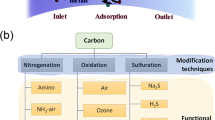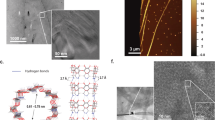Abstract
A NUMBER of attempts have been made to determine the adsorption of surface-active substances from solutions containing salts, by the use of the Gibbs' equation, in the form where dρ is the variation of the surface tension caused by a change dμb(= RTd log αB) in the potential of the substance B.1 The complete equation of Gibbs as applied to a ternary system A-B-S is but if the dividing surface up to which the solution is supposed to be perfectly homogeneous is defined so that T = 0, this becomes. This equation reduces to (1) when the variation of μs is negligible in comparison with that of μB. This will be the case when the concentration of B is very small, but will cease to hold at greater concentrations.
This is a preview of subscription content, access via your institution
Access options
Subscribe to this journal
Receive 51 print issues and online access
$199.00 per year
only $3.90 per issue
Buy this article
- Purchase on Springer Link
- Instant access to full article PDF
Prices may be subject to local taxes which are calculated during checkout
Similar content being viewed by others
References
For example, Goard and Rideal, J. Chem. Soc., 127, 1668, 1925; S. Palitzsch, Zeit. physikal. Chem., 147, 51; 1930.
Proc. Roy. Soc., A 129, 519; 1930.
Author information
Authors and Affiliations
Rights and permissions
About this article
Cite this article
BUTLER, J. The Determination of Adsorption in Ternary Solutions. Nature 127, 778–779 (1931). https://doi.org/10.1038/127778a0
Issue Date:
DOI: https://doi.org/10.1038/127778a0
Comments
By submitting a comment you agree to abide by our Terms and Community Guidelines. If you find something abusive or that does not comply with our terms or guidelines please flag it as inappropriate.



